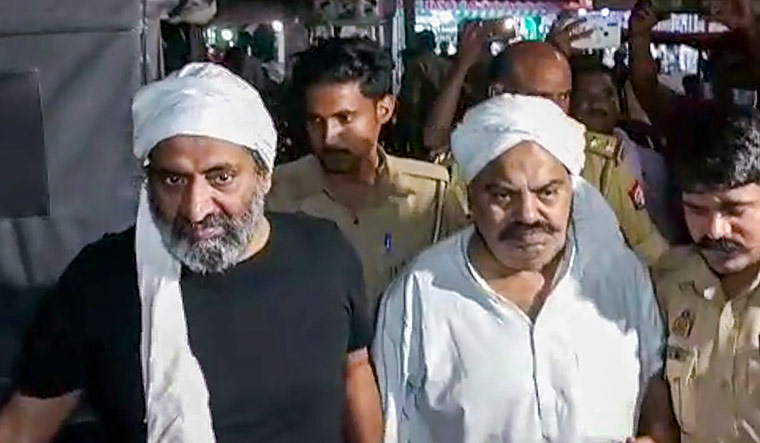Why Gangster Atiq’s Death Is Not An Occasion To Be ‘Celebrated’
Apr 23, 2023 | Shalini Rai
Atiq (right) and Ashraf Ahmed in UP's Prayagraj moments before they were shot (Image: PTI))
Last week, gangster-turned-politician Atiq Ahmed and his brother Ashraf were shot dead, while being taken for a medical test at a hospital in Uttar Pradesh’s Prayagraj. Ahmed had been a Member of Parliament and a Member of UP Legislative Assembly multiple times. There were atleast 160 criminal cases against him.
The murder was caught on camera; Atiq was shot at point blank range in the head, Ashraf was also shot from close range. Both perished within seconds, in front of the media contingent and police escort.
The fact that the murder was captured on camera was shocking enough. What made it more striking was the aftermath of the double-murder and the reactions from various quarters.
First, a word on the various anomalies leading up to the incident. Atiq had been making statements expressing apprehensions about his personal security, even going to the extent of saying, “They will finish me off and make it look like an encounter.” It would have been small comfort for Atiq when scores of media personnel followed him on his inter-state journey for a hearing just a few days before his murder. Did that stop ‘them’ from eliminating him?
That his eventual end came just the way he had feared it would, says a lot about the reliability of ‘secret’ information he was privy to, even when imprisoned and surrounded by police at all hours of the day and night.
His son Asad was killed in a police encounter in UP’s Jhansi just a few hours before Atiq was killed in Prayagraj. If you look closely at the turn of events, it becomes obvious that there was more to it than met the eye.
Among the many questions which arise, the foremost is why was he being taken for a medical at night, how did the media know he was going to be taken for the medical examination, why did his assassins chose to pretend to be mediapersons and why did the multiple number of policemen present with Atiq Ahmed do nothing at all to stop him being assassinated in front of their eyes?
Rajya Sabah MP Kapil Sibal raised certain questions on the incident which had been plaguing keen observers, among them (as mentioned above) why were Atiq and Ashraf taken for a medical check-up at 10pm, despite there having been no medical emergency? Why were the victims made to walk from the jeep to the hospital when their conveyance could have been taken right to the hospital entrance? How come it was open to the media (who informed the media about what should have been a highly-classified visit?)
As regards the presence of the three assassins, the questions that arise are why was the ‘event’ open to the media at all? Did the assassins know each other, were they acquainted with each other? How did they know who to target? Why was there some sort of coordination between them since the start? How come they came to acquire weapons worth over Rs 7 Lakh and were so obviously well-trained to shoot? And finally, the fact that all three of them surrendered — the questions are too many and so too are the coincidences.
It is no one’s case that gangster-turned-politician Atiq Ahmed and his brother should not have faced justice. Nor is this an acquittal of the two, their family members, their henchmen and supporters.
The only question this article is concerned about raising is should he have suffered such a fate, shockingly amplified by its live television coverage? Ideally, the law should have been allowed to run its course and their guilt established in front of the judiciary before any kind of punishment was awarded to them.
The media circus that it ended up becoming — and the bloodthirsty voices rejoicing the act on social media — was highly avoidable and sets a bad precedent.
Yes, the gangster-politician is dead. But so is the estimation of the weight of the rule of law and the primacy of the judiciary in our country. And that’s not something to be celebrated, ever.
